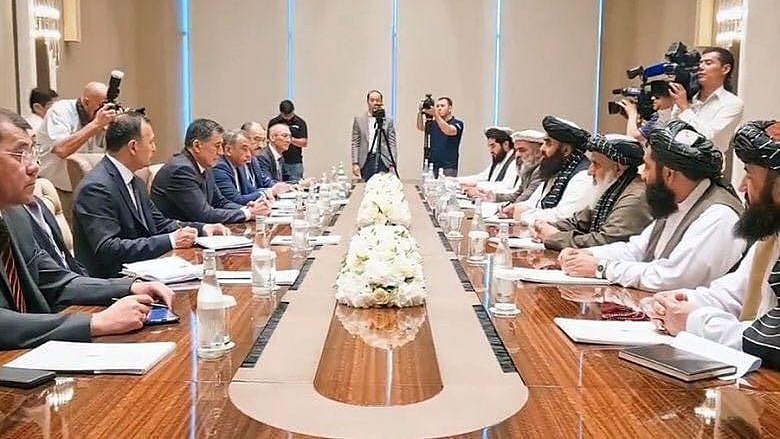Uzbekistan is expected to send a delegation to Kabul in the next few weeks for discussions with the Taliban on the Qosh Tepa canal currently being constructed along the Amu Darya river in northern Afghanistan.
According to Ulugbek Kosimov, the governor of the Surkhandarya region in Uzbekistan, which borders Afghanistan’s northern province of Balkh, the canal is being built in the area bordering Tajikistan but will impact all countries in the region that are downriver from the project.
Speaking after the 25th session of the General Assembly of the United Nations World Tourism Organization (UNWTO) in Samarkand on Tuesday, October 17, Kosimov said dates are being finalized for the meeting with the Taliban and the parties will consider the issue of water distribution during the planned talks.
“They (Afghanistan) haven’t opened the canal yet. Construction work on the river has not been completed. However, there will be an impact on [water volume], there will be a reduction. It will take more years to finish. Maintenance will also require large funds… Before this, the issue will be considered at the government level,” said Kosimov.
Last month, Uzbekistan President Shavkat Mirziyoyev raised concerns about the Taliban’s move to build the canal. Mirziyoyev said the Qosh Tepa canal could “radically” change the water levels and water balance of Central Asia.
Speaking at the fifth Consultative Meeting of Central Asian Heads of State in September, Mirziyoyev said a “new stakeholder” in the water use process has appeared in the region, a country “which is not bound by any obligations with our countries.”
It was at this meeting that he suggested the establishment of a joint working group to study all aspects of the construction of the canal and its impact on the water levels of the Amu Darya.
The Qosh Tepa canal will divert water from the Amu Darya river for irrigation. It will go through Balkh, Jawzjan and Faryab provinces.
Last week the Taliban announced the initial phase of the Qosh Tepa canal project had wrapped up after 18 months of work.
The Taliban’s national development company reported last Wednesday that Phase I took 18 months to complete, instead of the planned 24 months.
This is the Taliban’s first major infrastructure project, which once complete will divert about 20 percent of the water from the Amu Darya river across drought-stricken land in northern Afghanistan.
The main canal is expected to be 285 km long and the overall initiative seeks to convert 550,000 hectares of desert into farmland.
The first phase of the canal is 108 kilometers long and stretches from the Amu River to the Daulat Abad district in Balkh province.
The Taliban has made the canal a priority project and construction started early last year. According to the Taliban, surveys and design work for Phase II has already started.
The second phase of the canal starts from Dawlat Abad district in Balkh, passes through Aqcha area in Sheberghan city of Jawzjan and ends in Andkhoi city in Faryab province, which is 177 km long.
The third phase will include sub-channels.
The canal is 8.5 meters wide and will transfer 668.4 cubic meters of water per second.
Severe drought and a changing climate has wreaked havoc on rainfall patterns in the region and average temperatures across Afghanistan have risen by 1.8 degrees Celsius in the past 70 years, or twice the global average. This has impacted farmers considerably. But once the canal is complete tens of thousands of hectares of land will be arable – increasing Afghanistan’s chances of becoming self-sufficient in food production.
In June, US-based Foreign Policy Research Institute warned that the loss of water in the river will affect tens of thousands of people in downstream communities in Uzbekistan and Turkmenistan, and while the canal is not due to be completed until 2028, construction is proceeding ahead of schedule.
Afghanistan and its Central Asian neighbors have not signed any agreements on water use, and the institute reported that disputes over water use could suddenly become an issue that could derail ties between Afghanistan and Central Asian states and Iran.
Tough negotiations seem inevitable and while the governments in Turkmenistan and Uzbekistan ponder their strategy, they must be alarmed at clashes a few months ago along the Afghanistan-Iran border, due to another water dispute – this one regarding the Helmand river.





